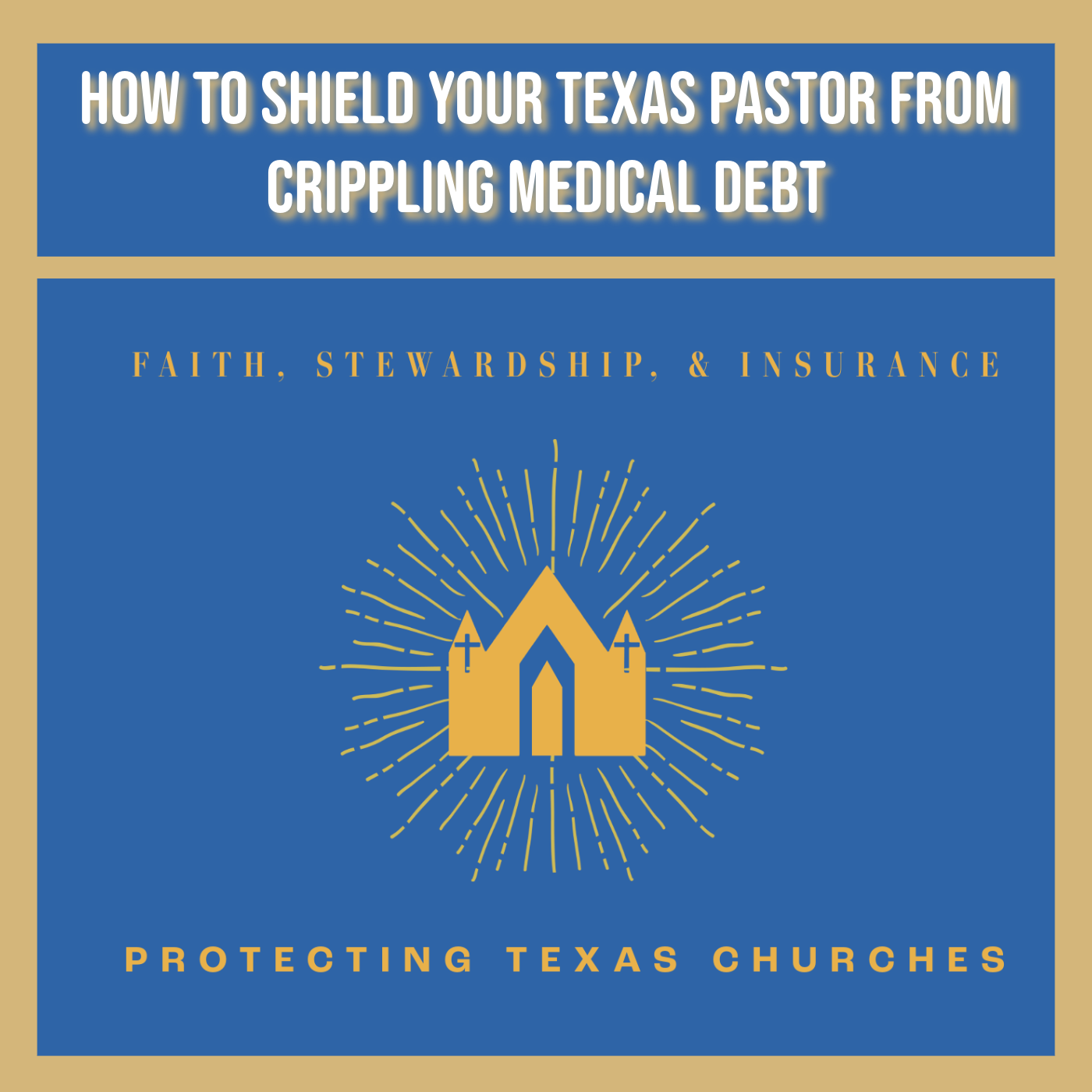- High-deductible health plans expose pastors and small church staff to financial landmines, like the $8,100 deductible that can lead to crippling debt and distract them from their ministry.
- Limited benefit policies (Accident, Critical Illness, and Indemnity Plans) offer a strategic, low-cost financial shield designed to close the medical bill gap created by high deductibles.
- By investing in these specific alternative health plans, small churches can provide a solid security layer that stabilizes their staff's personal finances, ensures they get necessary care, and offers the Promise of Certainty without the complexity or high cost of traditional group coverage.
You can also dive deeper in our FAQs at the bottom of the page.
The paper is thin, but the weight of it feels like a brick in Pastor John’s hand. He’s a faithful man, dedicated to his calling at a small church outside of Tyler. He is also responsible. Just like his father taught him to be.
Like many smaller churches across Texas, his congregation simply can't afford to provide a traditional group health plan for him or the church secretary. The size of the church has shrunk over the last few years and left them with more holes than solutions in their budget.
So John did the only practical thing he could. He secured health coverage through the Affordable Care Act Exchange Health Plans. To keep the monthly insurance premium low enough for his family, he had to take on a massive personal risk in the form of an $8,100 deductible.
That deductible is a financial landmine he had hoped to avoid this year, and it just exploded.
A few weeks ago, an unexpected, necessary outpatient procedure happened. Now, the medical billing statements are arriving. The first one is for $5,500. Every single dollar of it is applied directly to that deductible. That still has almost $3,000 left to fulfill.
He is sitting at his desk staring at the bill. The words for this Sunday’s sermon are a blur of worry. He knows the church budget is tight, and his family simply cannot afford this unexpected hit he was hoping to avoid. He’s desperately trying to figure out how to pay the bill without dipping into their meager savings or, worse, running up debt on the credit card. That stress is a physical weight on his shoulders, making it impossible to focus on the mission of his ministry to the church.

The $8,100 Problem That Stalls the Mission
John’s financial crisis isn't unique to him or Tyler. It’s an impossible dilemma faced by many staff members of dedicated small Texas churches every single day.
Church leaders want to care for their staff, and they understand that health insurance is a way to do that. But when the price tag of a traditional group health coverage comes across the table, it’s usually so high they feel forced to say no. They feel like they cannot afford to help, and that "no" leaves their pastor or key staff members completely exposed to rising healthcare expenses.
This choice forces people into high-deductible health plans if they take some sort of plan at all. They save a little bit of money on the family plan premium today, but they are completely exposed to a massive financial hole if anything unexpected happens tomorrow. That $8,100 deductible is the difference between a minor health setback and a personal financial crisis for the pastor’s family.
When a church feels they "can't afford to help," it leaves their pastor and staff exposed to crippling medical debt if they need anything beyond routine care. This instability quickly impacts their ability to serve and their ability to stay in ministry. This is not just a personal problem for John; it is a serious issue that directly affects the stability and mission of the church itself. Doing nothing means exposing the very people leading your mission to financial ruin.

Closing the Medical Bill Gap: Protection That Works for a Church Budget
You do not have to accept this impossible choice. The answer isn't a complex, expensive group plan that busts your budget and ties you up in endless paperwork. The true, powerful answer is a strategic layer of protection that costs a fraction of the price.
We need to think about closing the Medical Bill gap.
The Strategy: Limited Benefit Policies
For a small Texas church, the most cost-effective solution is to invest in specific, limited benefit policies like Accident, Critical Illness, or Indemnity Insurance Plans. These alternative health plans are not considered primary health insurance, but they serve an incredibly powerful purpose when you can't afford big health insurance costs. They act as the financial shield that protects your pastor from that $8,100 problem.
Accident and Critical Illness Plans are designed for the most destructive, expensive moments in life. They pay a cash benefit when a major event like a serious injury, a cancer diagnosis, or a heart attack occurs. It can be paid to either the family directly in cash or to the facility where care was rendered so that the bill is covered.
Imagine John’s situation again. If he had this coverage, that weighty bill never would have hit his hands with the right insurance coverage option. Or, he could use the cash to immediately wipe out that $8,100 deductible. These plans offer protection that stabilizes your staff when they need it most.
Indemnity Plans are another valuable piece of the solution. They pay fixed cash amounts for specific services, like a hospital stay or a doctor visit. While they don't cover the larger medical bills like a Critical Illness plan, they can be used to handle doctor visits, smaller deductible hits, or copays for preventive care. This makes them work perfectly alongside the major catastrophic coverage provided by the other alternative health plans.
By using these specific, low-cost plans, the church is giving their pastor the financial buffer he needs to handle the massive financial threats he is facing, all without requiring the church to manage the complexity and high cost of traditional group plans. You solve the problem without creating a bigger one.
Peace of Mind is Available Today
You can protect your pastor and staff from the anxiety and debt John is facing right now. You do not need to become an insurance specialist or expert. You just need a clear, personalized strategy that solves the specific financial constraints of a small Texas church.
It’s about building a solid security layer that creates stability and predictability for these important people. This move stabilizes your key staff member's personal finances and, ultimately, their ability to serve your community without the constant distraction of financial dread.
The guesswork around insurance is draining, especially when you are trying to be a good steward of church funds while caring for your people. That uncertainty needs to end. You can find the Promise of Certainty through True Texas Church Insurance. Stop guessing and stop worrying.
Click the button below to get a real health plan that can protect your pastor or staff from a situation like John's today.
FAQs - Frequently Asked Questions
What is "The $8,100 Problem" faced by small Texas churches?
The problem refers to the high-deductible health plans that small churches and their staff are often forced to choose due to budget constraints. The massive deductible, like the $8,100 deductible mentioned in the article, creates a large financial gap that can lead to crippling medical debt for pastors and staff if an unexpected procedure or illness occurs.
How can small churches protect their staff without buying a traditional group health plan?
Small churches can use a strategic layer of limited benefit policies such as Accident, Critical Illness, and Indemnity Insurance Plans. These are low-cost, alternative health plans that act as a financial shield. They pay a cash benefit directly to the staff member or facility to cover the large deductible or unexpected medical expenses.
ow do Accident and Critical Illness plans help close the Medical Bill Gap?
Accident and Critical Illness Plans are designed for major events like a serious injury, a cancer diagnosis, or a heart attack. They pay a cash benefit that can be used to immediately wipe out the high deductible and cover the remaining medical bills. Indemnity Plans complement this by covering fixed cash amounts for smaller expenses like doctor visits or copays, providing a security layer across different types of care.



